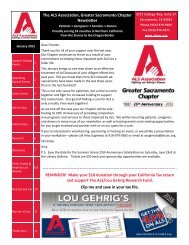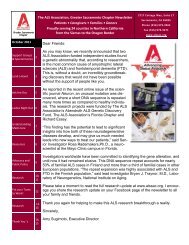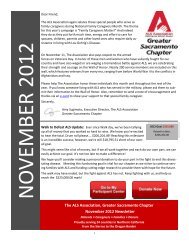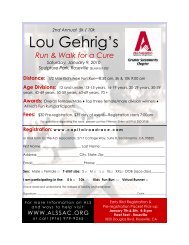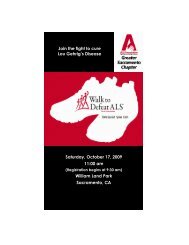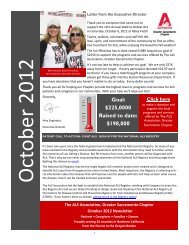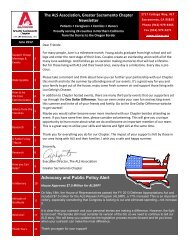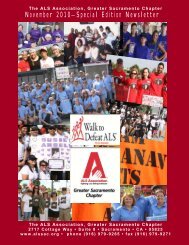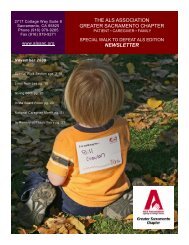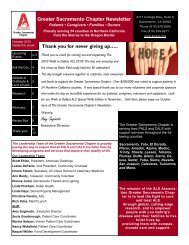April 2011 - The ALS Association Greater Sacramento
April 2011 - The ALS Association Greater Sacramento
April 2011 - The ALS Association Greater Sacramento
You also want an ePaper? Increase the reach of your titles
YUMPU automatically turns print PDFs into web optimized ePapers that Google loves.
Ask the Doc Q & A with Edward Kasarskis, MD, PhD<br />
Page 5<br />
Edward Kasarskis, M.D., Ph.D. is Director of the multidisciplinary <strong>ALS</strong> Center at the University of Kentucky<br />
Neuroscience Center in Lexington, Kentucky, professor in the Department of Neurology at the<br />
University of Kentucky, and Chief of Neurology at the VA Medical Center in Lexington KY.<br />
Q: I find that I sometimes overreact to something I hear, read, or see on TV. Occasionally I start crying;<br />
other times I seem to laugh uncontrollably. Is this something other people with <strong>ALS</strong> experience,<br />
or might I have another medical problem? Is there anything I can do about this?<br />
A: It’s perfectly normal to experience happy or sad feelings when you have <strong>ALS</strong>, of course. But if you<br />
find yourself laughing or crying excessively, or if your family or friends feel you are over-reacting to Dr. Kasarskis<br />
situations with more emotion than you typically did, that could suggest a problem. It’s not uncommon for people with<br />
<strong>ALS</strong> to have what is called “pseudo bulbar affect” (PBA), which is the proper medical term for this set of symptoms.<br />
PBA can occur in people with many different neurologic conditions and is recognized by involuntary, sudden, and frequent<br />
episodes of laughing and/or crying far in excess of situation which may have provoked it. <strong>The</strong> outbursts can<br />
cause embarrassment and anxiety, particularly when you’re with others. People with PBA may find it difficult to hold<br />
down a job or interact in social situations, and may isolate themselves as a result. One <strong>ALS</strong> patient of mine with PBA<br />
found that he couldn't discipline his child because he burst out laughing at his son's mischievous antics.<br />
It’s common for people with PBA to wonder how the problem can possibly be related to <strong>ALS</strong>, but it is. <strong>The</strong> PBA appearances<br />
are nothing more than exaggerated reflexes, and are yet another hyperactive reflex that reflects the "Upper Motor<br />
Neuron" involvement in <strong>ALS</strong>. Not surprisingly, people with other conditions, such as multiple sclerosis, stroke, traumatic<br />
brain injury, and other neurologic problems can also exhibit PBA.<br />
For years, people with PBA have been treated with a variety of anti-depressants, with only limited success. <strong>The</strong>re is,<br />
however, a new drug, just approved by the FDA, called Nuedextra® -- a fixed dose combination of dextromethorphan<br />
hydrobromide and quinidine (not quinine) sulfate -- that is effective in reducing PBA symptoms. (In the spirit of full<br />
disclosure, the University of Kentucky participated in the evaluation of the drug as a clinical trial study site, but there is<br />
no other potential conflict of interest). Neudextra may be a useful medication for people who find their episodes of<br />
laughing or crying interfering with their activities of daily living and quality of life.<br />
I suggest you discuss your own personal situation with your physician. He or she will help you decide whether your<br />
symptoms are significant enough to warrant taking the medication (which is given twice a day), and if the potential<br />
benefits make the drug worthwhile for you.<br />
If you would like to submit questions for a future Q & A, please send your questions to Amber Walters at awalters@alsa-national.org.<br />
<strong>The</strong> future is in your hands.<br />
Dream with us.<br />
Few of us will actually change the<br />
course of history or write the great<br />
American novel. But a legacy gift to<br />
<strong>The</strong> <strong>ALS</strong><br />
<strong>Association</strong>, through your will or<br />
living trust, can help ensure that<br />
our shared dream of a world without<br />
<strong>ALS</strong> becomes a reality. Help us<br />
keep hope alive for those<br />
battling <strong>ALS</strong> by supporting our work<br />
to eradicate this devastating disease.<br />
Please contact <strong>The</strong> <strong>Greater</strong><br />
<strong>Sacramento</strong> Chapter for more information.



